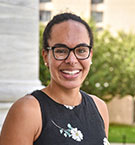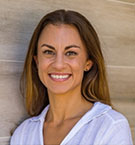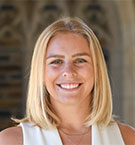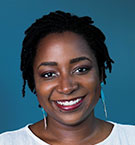Neurosurgical Equitable Wellness Lab
Contact Information
Overview
Theresa Williamson, MD is the director of the Neurosurgical Equitable Wellness (NEW) Lab, a dynamic, collaborative academic space consisting of individuals (e.g. researchers, technicians, clinicians, etc.) in the fields/discipline of neurosurgery and neuroscience. Together, we are committed to producing sustainable, equitable neurosurgery research, supporting individual and group wellness, and building a vibrant community of individuals navigating medicine.
Current Projects
- Disparities in Surgical Intervention, Health-Related Quality of Life, and Decision Making Among Racial Groups with Neurosurgical Problems
Racial and socioeconomic disparities in spine surgery for degenerative lumbar spondylolisthesis persist in the United States, potentially contributing to unequal health-related quality of life (HRQoL) outcomes. This is important as lumbar spondylolisthesis is one of the most common causes of surgical low back pain, and low back pain is the largest disabler of individuals worldwide.
Our cohort study analyzed prospectively collected data from 9,941 patients diagnosed with lumbar spondylolisthesis between 2015 and 2020 at five academic hospitals. We sought to assess the relationship between race, socioeconomic factors, treatment utilization, and outcomes in patients with lumbar spondylolisthesis.
This study found that BIPOC patients were less likely to utilize spine surgery for degenerative lumbar spondylolisthesis despite reporting higher pain interference, suggesting an association between race and surgical utilization. These disparities may contribute to unequal HRQoL outcomes for patients with lumbar spondylolisthesis and warrant further investigation to address and reduce treatment disparities.
We find that these and other disparities persist in other types of neurosurgical disease and work to design studies and interventions to improve equitable outcomes. - Shared Decision-Making in Lumbar Spine Treatment: Feasibility, Patient Reception, Socioeconomic Factors, and Influence on Treatment Concordance
Despite clinical practice guidelines recommending shared decision-making (SDM) to inform patient treatment preferences, little data exists on barriers to SDM in routine spine care. Our prospective interventional study presented the novel utilization of an SDM tool in spine care. The primary objectives were to evaluate SDM tool feasibility and patient reception, as well as whether SDM tools influence treatment concordance and ultimate treatment choice for patients considering lumbar spine surgery. Additionally, we evaluated how socioeconomic factors relate to SDM. - The Neurosurgical Equitable Wellness (NEW) Lab: Wellness and Mentorship
Physicians are leaving medicine at high rates, driven in part by burnout. New approaches are needed to engage, retain, and sustain physicians. To be a global leader in healthcare, it is essential that our workforce reflects the patients we serve and offers a variety of perspectives. This enables us to develop better solutions to our challenges and deliver higher quality patient care. This wellness and mentirship program is designed to be embedded within the NEW lab, the goal of which is to build a broader community to support individuals from all backgrounds navigating medicine. - Neurotechnology Justice (Harvard Medical School Center for Bioethics x Dana Foundation)
Rapidly advancing neurotechnologies are improving the prevention, diagnosis, and management of neurological and psychiatric conditions, revealing new insights about cognition, and may be used outside the clinic by employers, schools, and governments.
Against this backdrop, the Neurotech Justice Summit examined the meaning of “neurotech justice”, its interplay with “neurorights,” and how focusing on justice can positively shape the trajectory of neurotechnology development and application. Addressing the ethical, legal, social, and existential implications of emerging neurotechnologies is a complex task requiring input from various disciplines and stakeholders. This Summit brought to bear a range of such perspectives, including those of traditionally marginalized groups. The Summit featured presentations, conversations, and audience participation to explore how neurotech justice can be achieved in the medical clinic, in the legal courtroom, and in other vital social contexts.
About Dr. Williamson
 Theresa Williamson, MD, MPH
Theresa Williamson, MD, MPH
Co-Chair, Surgical Ethics Working Group, HMS Center for Bioethics
Faculty Neurosurgeon, Massachusetts General Hospital & Harvard Medical School
Director of Minimally Invasive Spine Service
Email: twilliamson1@mgh.harvard.edu
Theresa Williamson, MD, MPH is a neurosurgeon and surgical ethics researcher who cares for people with all types of spine disorders as well as brain and spinal trauma. Her clinical expertise includes tailoring an approach to best fit the patient and their disease including using minimally invasive techniques. Her research focus is neurosurgical decision-making and patient-doctor communication as well as health care disparities. She combines bioethics theory with empirical data science to tackle complex decision-making problems in neurosurgery. Dr. Williamson is a member of the Center for Outcomes and Patient Safety in Surgery (COMPASS) at Massachusetts General Hospital.
Dr. Williamson comes to MGH from Duke University. At Duke, she completed a neurosurgery residency. She then completed an intramural fellowship at Duke as part of the combined neurosurgery and orthopedic surgery complex spine fellowship approved by the Committee on Advanced Subspecialty Training (CAST). Her clinical skills were recognized when she was named the Resident Clinician of the Year (2017) and her leadership skills were recognized with the Leadership Award (2020). She completed the University of Chicago Maclean and American College of Surgeons Surgical Ethics Fellowship (2021). She is a graduate of the Yale School of Medicine (2014) and Yale College (2009) where she was a varsity soccer player.
Podcasts
NEJM Interview: Dr. Theresa Williamson on strategies for reducing the burden of the minority tax in academic medicine. Stephen Morrissey, the interviewer, is the Executive Managing Editor of the Journal.
T. Williamson, C.R. Goodwin, and P.A. Ubel. Minority Tax Reform — Avoiding Overtaxing Minorities When We Need Them Most. N Engl J Med 2021;384:1877-1879.
Past Events
Congress of Neurological Surgeons Annual Meeting 2023
Upcoming Events
NEW Lab November Series: Developing your Academic Identity
- Virtual series, November 7, 14, & 28
- Spring Lab Retreat: Date/Time/Location TBD
Recent Publications
- Guest, J., Kelly-Hedrick, M., Williamson, T., Park, C., Mansoor Ali, D., Sivaganesan, A., Neal, C. J., Tator, C., & Fehlings, M. G. (2023). Development of a Systems Medicine Approach to Spinal Cord Injury. Journal of Neurotrauma, 10.1089/neu.2023.0024. Advance online publication. https://doi.org/10.1089/neu.2023.0024
- Mitchell, T., Abdelgadir, J., Oshotse, C., Ubel, P. A., & Williamson, T. (2023). Definitely, Maybe: Helping Patients Make Decisions about Surgery When Prognosis Is Uncertain. The Journal of Clinical Ethics, 34(2), 169–174. https://doi.org/10.1086/724770
- Kelly-Hedrick, M., Ugiliweneza, B., Toups, E. G., Jimsheleishvili, G., Kurpad, S. N., Aarabi, B., Harrop, J. S., Foster, N., Goodwin, C. R., Shaffrey, C., Fehlings, M. G., Tator, C., Guest, J., Neal, C. J., Abd-El-Barr, M., & Williamson, T. (2023). Interhospital Transfer delays care for spinal cord injury patients: A Report from the North American Clinical Trials Network for Spinal Cord Injury. Journal of Neurotrauma, 10.1089/neu.2022.0408. Advance online publication. https://doi.org/10.1089/neu.2022.0408
- Williamson T. (2023). Preface to Clinical Neurosurgery Volume 69, Proceedings of the Congress of Neurological Surgeons 2022 Annual Meeting. Neurosurgery, 69(Suppl 1), N1. https://doi.org/10.1227/neu.0000000000002379
- Fourman, M. S., Siraj, L., Duvall, J., Ramsey, D. C., De La Garza Ramos, R., Hadzipasic, M., Connolly, I., Williamson, T., Shankar, G. M., Schoenfeld, A., Yassari, R., Massaad, E., & Shin, J. H. (2023). Can We Use Artificial Intelligence Cluster Analysis to Identify Patients with Metastatic Breast Cancer to the Spine at Highest Risk of Postoperative Adverse Events?. World Neurosurgery, 174, e26–e34. https://doi.org/10.1016/j.wneu.2023.02.064
- Mitchell, T., Giusto, A., Greene, C., Staples, B., Haglund, M., & Williamson, T. (2023). Commentary: Workplace Meaning for Workplace Wellness: One Health System's Early Experience With a Mobile Application. Neurosurgery, 92(4), e84–e86. https://doi.org/10.1227/neu.0000000000002389
- McCray, E., Waguia, R., de la Garza Ramos, R., Price, M. J., Williamson, T., Dalton, T., Sciubba, D. M., Yassari, R., Goodwin, A. N., Fecci, P., Johnson, M. O., Chaichana, K., & Goodwin, C. R. (2022). Racial disparities in inpatient clinical presentation, treatment, and outcomes in brain metastasis. Neuro-Oncology Practice, 10(1), 62–70. https://doi.org/10.1093/nop/npac061
- Kelly-Hedrick, M., Abd-El-Barr, M., Aarabi, B., Curt, A., Howley, S. P., Harrop, J. S., Kirshblum, S., Neal, C. J., Noonan, V. K., Park, C., Ugiliweneza, B., Tator, C., Toups, E. G., Fehlings, M. G., Williamson, T., & Guest, J. (2022). The Importance of Prospective Registries and Clinical Research Networks in the Evolution of Spinal Cord Injury Care. Journal of Neurotrauma, 10.1089/neu.2022.0450. Advance online publication. https://doi.org/10.1089/neu.2022.0450
- Vedantam, A., Ugiliweneza, B., Williamson, T., Guest, J., Harrop, J. S., Tator, C., Aarabi, B., Fehlings, M. G., Kurpad, S. N., & Neal, C. J. (2022). The Evolving Profile of Acute Spinal Cord Injury Demographics, Outcomes and Surgical Treatment in North America: Analysis of a Prospective Multicenter Dataset of 989 Patients. Journal of Neurotrauma, 10.1089/neu.2022.0410. Advance online publication. https://doi.org/10.1089/neu.2022.0410
- Duvall, J. B., Massaad, E., Siraj, L., Kiapour, A., Connolly, I., Hadzipasic, M., Elsamadicy, A. A., Williamson, T., Shankar, G. M., Schoenfeld, A. J., Fourman, M. S., & Shin, J. H. (2023). Assessment of Spinal Metastases Surgery Risk Stratification Tools in Breast Cancer by Molecular Subtype. Neurosurgery, 92(1), 83–91. https://doi.org/10.1227/neu.0000000000002180
- Tabarestani, T. Q., Lewis, N. E., Kelly-Hedrick, M., Zhang, N., Cellini, B. R., Marrotte, E. J., Williamson, T., Wang, H., Laskowitz, D. T., Faw, T. D., & Abd-El-Barr, M. M. (2022). Surgical Considerations to Improve Recovery in Acute Spinal Cord Injury. Neurospine, 19(3), 689–702. https://doi.org/10.14245/ns.2244616.308
- Williamson, T., Massaad, E., & Shin, J. H. (2022). Commentary: Sacral Pedicle Subtraction Osteotomy for Treatment of High-Grade Spondylolisthesis: A Technical Note and Review of the Literature. Operative Neurosurgery (Hagerstown, Md.), 23(2), e93–e94. https://doi.org/10.1227/ons.0000000000000310
- Hatfield, J., Fah, M., Girden, A., Mills, B., Ohnuma, T., Haines, K., Cobert, J., Komisarow, J., Williamson, T., Bartz, R., Vavilala, M., Raghunathan, K., Tobalske, A., Ward, J., & Krishnamoorthy, V. (2022). Racial and Ethnic Differences in the Prevalence of Do-Not-Resuscitate Orders among Older Adults with Severe Traumatic Brain Injury. Journal of Intensive Care Medicine, 37(12), 1641–1647. https://doi.org/10.1177/08850666221103780
- Williamson, T. L., Adil, S. M., Shalita, C., Charalambous, L. T., Mitchell, T., Yang, Z., Parente, B. A., Lee, H. J., Ubel, P. A., Lemmon, M. E., Galanos, A. N., Lad, S. P., & Komisarow, J. M. (2022). Palliative Care Consultations in Patients with Severe Traumatic Brain Injury: Who Receives Palliative Care Consultations and What Does that Mean for Utilization?. Neurocritical Care, 36(3), 781–790. https://doi.org/10.1007/s12028-021-01366-2
- Le, B., Rosens, E., McMillan-Drendel, E., Marco, D., Williamson, T., & Philip, J. (2021). State-wide telephone support: enhanced palliative care service delivery. BMJ Supportive & Palliative Care, bmjspcare-2021-003264. Advance online publication. https://doi.org/10.1136/bmjspcare-2021-003264
- Price, M., Howell, E. P., Dalton, T., Ramirez, L., Howell, C., Williamson, T., Fecci, P. E., Anders, C. K., Check, D. K., Kamal, A. H., & Goodwin, C. R. (2021). Inpatient palliative care utilization for patients with brain metastases. Neuro-Oncology Practice, 8(4), 441–450. https://doi.org/10.1093/nop/npab016
- Srinivasan, E. S., Karikari, I. O., Williamson, T., Shaffrey, C. I., & Than, K. D. (2021). Front-Back Cervical Deformity Correction by Anterior Cervical Discectomy and Fusion With Posterior Instrumentation: 2-Dimensional Operative Video. Operative Neurosurgery (Hagerstown, Md.), 21(3), E235. https://doi.org/10.1093/ons/opab191
- Williamson, T., Hodges, S., Yang, L. Z., Lee, H. J., Gabr, M., Ugiliweneza, B., Boakye, M., Shaffrey, C. I., Goodwin, C. R., Karikari, I. O., Lad, S., & Abd-El-Barr, M. (2021). Impact of US hospital center and interhospital transfer on spinal cord injury management: An analysis of the National Trauma Data Bank. The Journal of Trauma and Acute Care Surgery, 90(6), 1067–1076. https://doi.org/10.1097/TA.0000000000003165
- Williamson, T., Goodwin, C. R., & Ubel, P. A. (2021). Minority Tax Reform - Avoiding Overtaxing Minorities When We Need Them Most. The New England Journal of Medicine, 384(20), 1877–1879. https://doi.org/10.1056/NEJMp2100179
- Williamson, T., Giusto, A., Haglund, M., McDaniel, K., & Weisberg, L. (2021). Commentary: "Everyone Needs an Ally": Piloting Peer-CAlly, a Peer-Coaching Program Using Existing Resources for Neurosurgery Residents. Neurosurgery, 88(6), E558–E561. https://doi.org/10.1093/neuros/nyab049
- Jones, R. C., Creutzfeldt, C. J., Cox, C. E., Haines, K. L., Hough, C. L., Vavilala, M. S., Williamson, T., Hernandez, A., Raghunathan, K., Bartz, R., Fuller, M., & Krishnamoorthy, V. (2021). Racial and Ethnic Differences in Health Care Utilization Following Severe Acute Brain Injury in the United States. Journal of Intensive Care Medicine, 36(11), 1258–1263. https://doi.org/10.1177/0885066620945911
Lab Members
 Ali Giusto, PhD
Ali Giusto, PhD
Assistant Professor | Licensed Psychologist
Columbia University Medical Center/New York Psychiatric Institute
Ali Giusto, PhD is a licensed clinical psychologist and assistant professor. She has expertise in intervention design, implementation science, global mental health, research and evaluation, and community-engaged methods. Clinically, her areas of expertise include youth and family well-being, leadership, healthy relationships, cultural and contextual adaptation, and mental health. Notably, she and Dr. Williamson co-developed a model of coaching for neurosurgery residents at Duke University. She completed her undergraduate degree in Psychology at Yale University; her PhD in Clinical Psychology at Duke University; and Clinical and Postdoctoral training at Columbia University Medical Center.
 Emmy Duerr, BS
Emmy Duerr, BS
Clinical Research Coordinator
Massachusetts General Hospital & Harvard Medical School Center for Bioethics
Email: ecduerr@mgh.harvard.edu
Emmy Duerr, BS is a clinical research coordinator at Massachusetts General Hospital and the Harvard Center for Bioethics. She recently received her B.S. in Biology and Global Health with a minor in Chemistry at Duke University, where she also competed on the varsity women’s soccer team. During her undergraduate experience, Emmy worked at the Duke Global Health Institute and the Center for Health Policy and Inequalities Research, where she explored her interests in health equity and intersectionality in patient care. In the future, she hopes to join a medical school that allows her to integrate her interests in public health, surgery, and bioethics. In her free time, Emmy enjoys reading, yoga, good coffee, live music, and cheering for the NY Giants.
 Jasmine Kwasa, PhD
Jasmine Kwasa, PhD
Post-doctoral Fellow, Carnegie Mellon Neuroscience Institute
Chief Technology Officer, Precision Neuroscopics, Inc.
Email: jkwasa@andrew.cmu.edu
Jasmine Kwasa, PhD, is a post-doctoral fellow in the Neuroscience Institute at Carnegie Mellon University (CMU) and chief technology officer of Precision Neuroscopics, Inc. Her past work using EEG and signal processing to understand auditory cognition inspired her to think about the lack of inclusivity in our human neuroscience tools. She now develops non-invasive neurotechnologies specifically suited for coarse, curly hair and dark skin pigmentation (melanin) in the lab of Pulkit Grover, PhD. She is currently conducting clinical studies on the use of inclusive “Sevo” electrodes to improve EEG quality on Black patients and will be expanding this work to the African continent as a Fulbright U.S. Scholar in late 2023. Jasmine is also a neuro-ethicist and writes about the future of inclusive neurotech and the history of racial bias in neuroscience, medicine, and technology. Jasmine has been honored with several awards and distinctions, including being named a “Rising Star” in Engineering in Health from MIT, Johns Hopkins, and Columbia. Jasmine earned her B.S. in BME from Washington University in St. Louis, M.S. in BME from Boston University, and Ph.D. in Electrical and Computer Engineering from CMU. In her free time, Jasmine is a dance enthusiast and enjoys travel and quality time with her enormous family.
 Christiana Oshotse, BA
Christiana Oshotse, BA
MS2 at Harvard Medical School
Graduate Research Assistant
Christiana Oshotse, BA is a second-year medical student at Harvard Medical School. She grew up partly in Lagos, Nigeria and in Atlanta, Georgia before attending Duke University for her undergraduate career. She studied public policy while at Duke and engaged in health services research on both public and global health projects. Christiana is interested in addressing issues at the intersections of neurosurgery, policy, and public health. She ultimately desires to contribute to health systems strengthening both in the U.S. and in African countries.
Christiana enjoys solo traveling, trying new restaurants, shopping for vintage fashion pieces, practicing yoga, and reading—suspense fiction and African and African American literature are her favorite genres.
